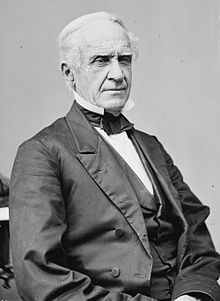Francis Thomas
Francis Thomas (born February 3, 1799 in Frederick County , Maryland , † January 22, 1876 in Frankville , Maryland) was an American politician and governor of the state of Maryland from 1842 to 1845 and from 1831 to 1841 and again between 1861 and 1869 Member of the US House of Representatives .
Early years and political advancement
Francis Thomas attended St. John's College in Annapolis . After completing a law degree, he was admitted to the bar in 1820. Then he began to work in Frankville in his new profession. He was elected to the Maryland House of Representatives in 1822, 1827, and 1829 . There he was President of the House as Speaker in 1829 . Between 1831 and 1841 he represented his state in the US House of Representatives in Washington . At that time he was a member of the Democratic Party . In the US Congress he was chairman of the legal committee and a member of the committee on maritime affairs ( Committee on Naval Affairs ). Between 1839 and 1840 Thomas was also President of the Chesapeake & Ohio Canal Company .
Governor of maryland
On October 6, 1841, Francis Thomas was elected the new governor of his state by just 600 votes ahead of Whig candidate William Cost Johnson . He began his three-year term on January 3, 1842. During this time the first telegraph connection between Baltimore and Washington was established. Governor Thomas worked to reduce the national debt. However, he did not succeed in achieving this goal by the end of his term in office. The attempt to raise taxes met with widespread opposition in Maryland. The railway expansion continued. At that time, the link between Baltimore and Cumberland was completed.
In the national conflict between the northern and southern states over the question of slavery, Thomas was a staunch opponent of this institution. He was considered a possible democratic presidential candidate for the elections in 1844. A divorce affair damaged his reputation considerably, so that he did not pursue his candidacy any further.
Further political career
In 1850, Thomas served in a meeting to revise the Maryland Constitution. Thomas changed his party affiliation in the course of the 1850s. As a unionist , he was re-elected to the US House of Representatives in 1861. He later joined the Republicans . He remained in Congress until 1869. There he witnessed the entire Civil War and the impeachment proceedings against President Andrew Johnson . In 1866 he was a delegate to the National Union Convention in Philadelphia . Between 1870 and 1872 he was a tax officer ( collector of internal revenue ) in the State of Maryland. His last political office he held from 1872 to 1875 as the United States Ambassador to Peru , where he succeeded Thomas Settle .
Old age and death
After returning from Peru, he withdrew from politics. He devoted himself to his private affairs, which now also included agriculture. He owned a substantial estate in Frankville. There he was struck by a locomotive during a tour in 1876 and killed. Until his divorce, he was married to Sally Campbell McDowell, daughter of James McDowell , who was governor of Virginia from 1843 to 1846 .
Web links
- Francis Thomas in the National Governors Association (English)
- Francis Thomas in the Biographical Directory of the United States Congress (English)
- Francis Thomas in the database of Find a Grave (English)
| personal data | |
|---|---|
| SURNAME | Thomas, Francis |
| BRIEF DESCRIPTION | American politician, governor of Maryland |
| DATE OF BIRTH | February 3, 1799 |
| PLACE OF BIRTH | Frederick County , Maryland |
| DATE OF DEATH | January 22, 1876 |
| Place of death | near Frankville , Maryland |


